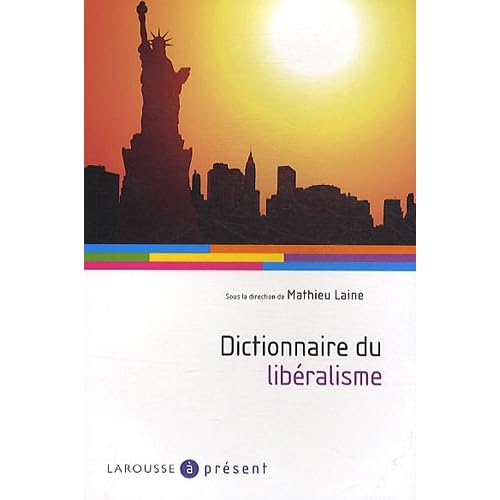In his magnificent Classical Liberalism and the Austrian School, Ralph Raico recently stressed that there never has been any such thing as “classical” liberalism. There was and is only liberalism, an intellectual movement centred around the notion that society is working by itself and does not need to be supported, or reigned in, by coercive government.

True, the word liberalism has also been adopted by various enemies of liberty and turned into the opposite of its traditional meaning. But this perversion of language is by and large limited to the Anglo-Saxon world. On the old Continent, despite recent efforts by social democrats and other statists to appropriate the labels of liberty and liberalism, the latter is still being used in its original meaning. And the liberal movement is thriving even in those countries where coercive government is omnipresent.
To wit, a 639-pages Dictionnaire du libéralisme has just been published in France by the prestigious Larousse publishers. Edited byMathieu Laine, this compendium features 267 entries from “Action humaine” to “Voltaire” written by 63 authors from France and other countries. It is a landmark publication with a distinctly Austrian flavour.
Among the authors who are better known by readers of this blog are Pascal Salin, Jesus Huerta de Soto, Gary Becker, Anthony de Jasay, Carlo Lottieri, Frédéric Sautet, Hernando de Soto, Nikolay Gertchev, Cécile Philippe, Philippe Nataf, Antoine Gentier, and the present author. Among the other authors who are less well known here, but who belong to the most eminent representatives of French liberalism, are Raymond Boudon (sociology), Betrand Lemennicier (economics), Alain Wolfelsperger (economics), Jean-Philippe Feldman (law), Pierre Garello (economics), Alain Laurent (philosophy), and Florin Aftalion (finance).

Another important author who is as yet virtually unknown in the US is the editor himself. Mathieu Laine (pictured) is a trained lawyer who runs his own (already prestigious) consulting company and is an adjunct professor at “Sciences-Po” — the no. 1 political-science school in France. He is the author of several prized books such as La Grande Nursery (2006), La France est foutue(2007), and Post politique (2009). Six years ago he was my co-editor publishing a festschrift for Pascal Salin.
A look at the index reveals the intellectual godfathers of the Dictionnaire. It is unsurprising to find many references to great historical figures of French liberalism such as Frédéric Bastiat, Benjamin Constant, Yves Guyot, Montesquieu, Jean-Baptiste Say, and Alexis de Tocqueville. Astonishingly, however, the four main authorities are foreign authors: F.A. Hayek, Ludwig von Mises, Murray Rothbard, and Adam Smith. Minor authorities are Carl Menger, Ayn Rand, Milton Friedman, and John Locke. Still less important but noteworthy are Raymond Aron, James Buchanan, David Hume, Israel Kirzner, David Ricardo, and Karl Popper.
In a word, therefore, the Dictionnaire is squarely built on the foundations laid by the Austrian School, even more so than theEncyclopedia of Libertarianism edited four years ago by Ronald Hamowy. It is destined to remain a major international reference on its subject for many years to come. For French readers it represents, finally, a reliable source of information on the nature and scope of modern liberalism. It is an ideal companion volume to the equally comprehensive Histoire du libéralisme en Europe, edited six years ago by Philippe Nemo and Jean Petitot.
By
Tratto da http://goo.gl/mag/fgSdQ
Commenti